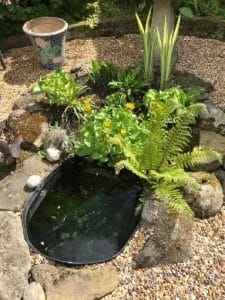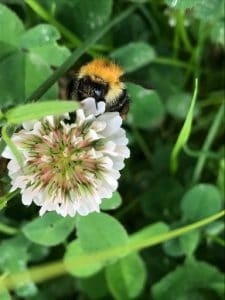Wildlife Friendly Gardens
 Checklist
Checklist
Make your garden a ‘biodiversity hotspot’ & reduce your carbon footprint.
Whether your garden is large, small or even if you just have a window box or a few tubs you can make a difference.
- Let the grass grow. Leave the lawn mower in the shed and let the flowers provide a nectar feast for hungry pollinators. Checkout Plantlife’s #No Mow May & #LetitBloom June campaigns. Cut your lawn less often & leave some areas of long grass. Find out about our wildflower and pollinator project here.
- Leave cutting back perennials until the spring to provide habitat for overwintering insects, and seeds for birds.
- Leave a messy corner – a woodpile for insects, a pile of leaves for hedgehogs.
- Cut a hedgehog sized hole in your garden fence like this and install a hedgehog house like this. Find out about Addingham’s hedgehogs and how you can help them here.
 Dig a wildlife pond like this, to provide a home for threatened frogs and newts and insects. Emerging insects will provide a nutrient rich feast to attract birds and bats to your garden. Frogs will help to control slugs too. Even a small container pond or bird bath will be beneficial.
Dig a wildlife pond like this, to provide a home for threatened frogs and newts and insects. Emerging insects will provide a nutrient rich feast to attract birds and bats to your garden. Frogs will help to control slugs too. Even a small container pond or bird bath will be beneficial.- Plant a small native tree (Crab apple, Rowan or Field Maple are good choices) if you have room – shelter and food for birds, insects and bats. Check out the The Woodland Trust for more information on native species to plant. You might like to consider supporting the Trust by buying your trees from them.
- Plant a hedge
 with native species rather than putting up a fence for shelter and food for birds, insects and bats.
with native species rather than putting up a fence for shelter and food for birds, insects and bats. - Choose your plants with hungry pollinators in mind. Try to have nectar and pollen rich flowers in bloom through the whole season from March to October for bumblebees and butterflies.
 Plant flowers that release their scent in the evening to attract moths and bats looking for an insect-meal in your garden.
Plant flowers that release their scent in the evening to attract moths and bats looking for an insect-meal in your garden.- Have a good variety of plants, including some tall shrubs and climbers.
- Avoid poisons (herbicides and pesticides) – try natural methods of control such as companion planting Try organic methods.
- Learn to love (or at least tolerate) ‘weeds’. Even if you don’t use water course polluting weedkillers, every dandelion you dig up robs pollinating insects of nectar. Bare newly weeded soil is vulnerable to oxidation, releasing the carbon it stores into the atmosphere as CO2.
- Growing plants from seed yourself or taking cuttings, rather than buying from the garden centre is cheaper, uses less energy and ensures plants are pesticide free and the compost peat free! Get in touch (using the Contact Form) if you would like to join our friendly wildflower and vegetable growing teams.
- Take care of your soil, not only to help your plants grow well, but to provide a wildlife habitat while storing lots of carbon and water too.
- Turn your vegetable peelings and garden cuttings into compost, an open compost bin if you have room is also a great habitat for insects, hedgehogs and slowworms.
- If space is limited, a wormery is a good alternative for making use of your food waste to produce homemade fertilizer for your garden. Get in touch (using the Contact Form) if you would like to find out about our wormery project.
- Make sure any compost you buy is peat free. Not only because peat bogs store enormous amounts of carbon but they are a unique and rapidly shrinking habitat. Check out Climate Change Ilkley’s handy guide to peat free composts and where to buy them locally.
Take the Wildlife Trust’s gardening survey to see how wildlife friendly your garden is. Let’s get Addingham’s wildlife friendly gardens on the map.
If you would like a locally made bird box, a bat box, a hedgehog house, a bee hotel or anything else made of recycled wood by The Shed Project click here for more information.
There are lots of tips and advice out there. Here are some more useful links:
https://www.wildlifetrusts.org/gardening
https://www.soilassociation.org/take-action/growing-at-home/wildlife-haven-garden/
https://www.rhs.org.uk/gardening-for-the-environment/planting-for-the-environment
https://www.rhs.org.uk/gardening-for-the-environment/planet-friendly-gardening-tips
https://www.rspb.org.uk/birds-and-wildlife/advice/gardening-for-wildlife/

